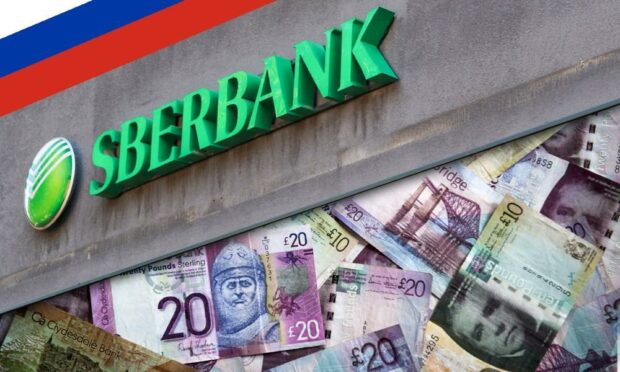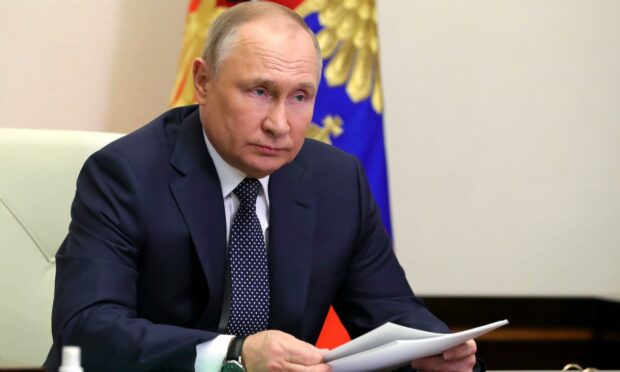Scottish council pension pots had a massive £35 million tied up in Russia before the Ukraine invasion – including “shocking” investments in Vladimir Putin’s government and some of the world’s worst polluters.
Our investigation has exposed the true scale of holdings which dramatically collapsed in value when Russia was hit with sanctions after its brutal military invasion of its neighbour.
One council is facing questions after it released data to us showing investments in 54 Russian companies and organisations.
It included 21 which appear to be directly linked to the Russian government or its finance ministry.
They also include in metals firm Norilsk Nickel, oil company RussNeft, mining business Evraz, gas giant Gazprom, and three Russian banks.
‘Shocking investments’
Scottish local government pension funds have more than 236,000 active members, over 140,000 deferred members and more than 169,000 pensioners and dependents.
Almost all of the 11 local government pension schemes in Scotland confirmed they previously held direct or indirect investments in Russian businesses.
In the days after Russian forces entered Ukraine in February, fund managers scrambled to sell-off the holdings but their value had taken a pounding.
Strathclyde pension fund, one of the largest of its kind in the UK, purchased holdings in Moscow’s Sberbank, which is Russia’s biggest lender and majority owned by the Kremlin.
Scotland’s local authorities should be making investments that benefit the common good, not boosting Putin’s or his associates.”
Ross Greer MSP
It also had stock in the VK internet company, all purchased in September last year.
They were initially worth £18.9m, with the value falling to £16.4m by December 31, then plummeting to just £86,376 by March, after some sales.
Tayside exposure
The Tayside fund invested in Sberbank in 2013, and in VK in 2018, and the holdings were worth more than £4.7m by the end of last year.
But within four days of Russia’s invasion of Ukraine, the pension fund sold just more than a third of its £4m Sberbank holdings for just £112,000.
The remaining shares in the bank were worth only £174,000 on February 28.
Like most of the Scottish local government pension funds, the Tayside pot had no money tied up in Russian businesses by March.
The Highland fund had investments worth £3.75m in Sberbank at December 31, but after offloading about a third of the holdings by the end of March this year, the value was just £6,784.
Pension value plummeted
Similarly, the Highland fund had a £750,000 stake in VK that was worth £17,628 by March.
Orkney’s council pension pot had £2.1m invested in Sberbank and VK, but its value fell to £82,500 by February 28.
Meanwhile, Aberdeen City Council said the North East Scotland fund had £3.5m invested in five Russian companies via pooled funds in December last year, but had removed all of this exposure by March.
Scottish Green MSP Ross Greer said it shouldn’t take war to change investment practices.
“Scotland’s local authorities should be making investments that benefit the common good, not boosting Putin’s or his associates,” he said.
“These investments should never have been made in the first place, and it shouldn’t have taken a catastrophic war in Europe to put a stop to them, but progress is progress and it should be welcomed.”
Lothian’s pension fund reported £1.323m worth of holdings in Sberbank and VK, which had plummeted to £52,000 by February 28, and just £5.07 by March 14.
The Shetland pot had Russian exposure of £368,000 at the end of January but the local authority said it could not release details of individual shares.
Only Fife said its pension fund had no Russian investments.
Council links to Putin’s government
The Scottish Borders fund had little more than £500,000 invested in Russia but had by far the highest number of holdings, according to its response to our freedom of information request.
Scottish Labour’s Sarah Boyack said the scale is “shocking” and raises questions about due diligence.
“This is a local authority with a history investing in Russian companies that are so badly behaved that the Russian government themselves have had to sanction them,” she said.
‘Gulags’
The Borders fund had 21 which looked connected to the Russian government, as well as funds in huge companies.
“The Scottish Borders Council has invested in a company that is reported to produce nearly 2% of the world’s global emissions and in 2016 allowed a pollution spillage that turned rivers red with toxins,” she added, referring to a case involving Norilsk Nickel.
“Some of these companies were founded by the forced labour of the gulags and are now owned by Russian oligarchs.”
The Scottish Borders Council was approached for comment.


